If you run out of storage space on your phone or tablet, you’ll want to find a way to get more. One of the simplest options is to insert a microSD card. Sadly, not all smartphones and tablets support microSD cards. If you have an iPhone or iPad, you’re out of luck. Fortunately, some of the best Android smartphones and tablets do support them, although if you’re the owner of a Samsung Galaxy S22 Ultra, you might be disappointed to note that the microSD card slot seems to be gone for good from Samsung’s latest flagships.
It’s best to fully understand how to use a microSD to get the most out of it. To see if your device accepts them, check the full specs for your phone on the manufacturer’s website or look for a microSD card slot in your phone. On newer phones, they’re generally part of the SIM tray.
We’ve picked out eight of the best microSD cards for smartphones, with options suitable for casual to professional use. You may want to look beyond this list, but we advise you to stick to well-known brands such as Samsung, Lexar, SanDisk, Toshiba, and Kingston. All prices are correct at the time of writing, but the microSD card market moves fast, so expect them to change.
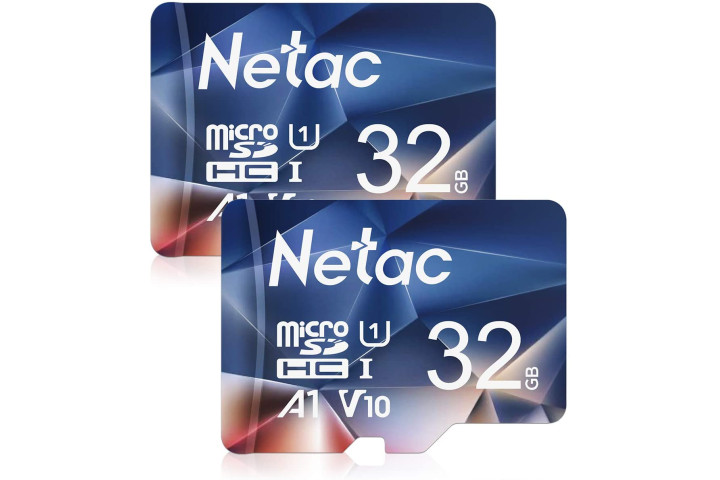
Netac 32GB
Pros
- Ultra-rugged design withstands extreme conditions
- Up to 90MBps read speeds
- Handy two-pack
Cons
- Write speeds are a bit slow
The first card on our list isn’t actually from one of the major brands we recommended sticking with a moment ago but bear with us. Netac’s 32GB microSD card comes in a handy two-pack and is the card to go for if you’re using your phone or tablet in adverse conditions or switching it out frequently. It’s ultra-rugged, built to withstand extreme heat and cold, water, and shock. It’s even X-ray proof. With up to 90MBps read speeds, it’s no slouch in the performance department either, though write speeds are a little slow at 10MBps. At $12 for a two-pack, it’s one of the more affordable options on our list, too.


SanDisk
SanDisk Extreme 32GB
Pros
- UHS Speed Class 3
- Read speeds up to 100MBps
- Write speeds up to 60MBps
- Lifetime warranty (most regions)
- Comes with SD adapter
Cons
- You may want a larger capacity if buying it for 4K video
Here’s a speedy SDHC card that offers read speeds of up to 100MBps and write speeds of up to 60MBps. This is a durable card with a lifetime warranty in most regions, and the reviews are overwhelmingly positive. It will have no trouble with 1080p video and can even handle 4K, though you may want a larger capacity if that’s what you’re buying it for. It is certified UHS Speed Class 3, V30, and A1 for Adoptable Storage. It also comes with a handy SD adapter.

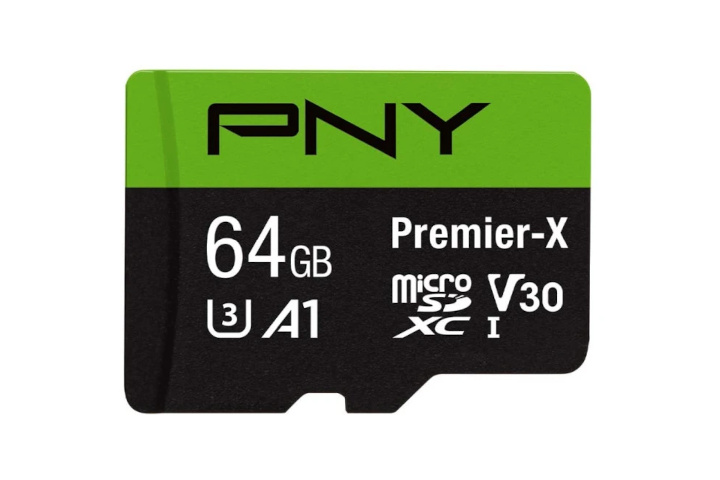
PNY Premier-X 64GB
Pros
- UHS Speed Class 3
- Read speeds up to 100MBps
- A1 app performance lets you run apps directly from the card
- Comes with SD adapter
Cons
- Some reviews report receiving a faulty card
This SDXC card is rated as UHS 3 for faster transfers and offers a read speed of up to 100MBps (slightly lower for write speed). It’s a durable, reliable option from a reputable brand that has great reviews. A1 app performance means you can run apps directly from the card, making this an excellent choice for your phone, and it’s also no slouch for Full HD photography and 4K Ultra HD videography. It comes with a handy SD adapter, too.


Lexar
Lexar Professional 2000x 128GB
Pros
- UHS Speed Class 3
- Read speeds up to 300MBps
- Supports 4K video recording
- Handy two-pack
- Designed for professional use
Cons
- More expensive than some other brands
This twin-pack of fast-acting microSD cards is a great option for those looking for the most bang for their buck. You get two SD UHS 3 rated cards that support read speeds of up to 300MBps. This card supports 1080p Full HD, 3D, and 4K video recording with ease. If you’re the friend who always seems to be filming videos on your mobile device, you’ll find that this card is an excellent match. And you get two cards for the price, so you’ll always have a backup.

Lexar Professional 2000x 128GB
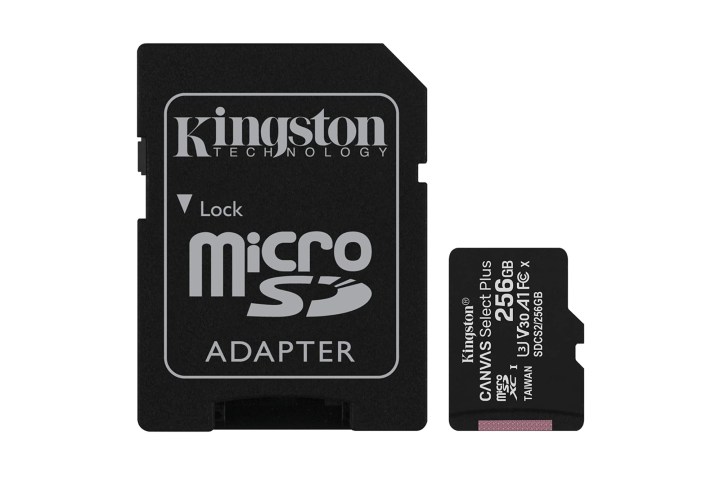
Kingston
Kingston Canvas Select Plus 256GB
Pros
- UHS Speed Class 3
- A1 app performance lets you run apps directly from the card
- Read speeds up to 100MBps
- Includes SD adapter
Cons
- No support for 4K video recording
This UHS 3 card is A1 rated, so it’s optimized for use in Android phones. It supports up to 256GB at a cost that fits many budgets, and it can easily support 1080p video recordings. Unfortunately, this card doesn’t have a write speed capable of executing 4K video recordings, but it does have an improved read speed of up to 100MBps. Your purchase also comes with an SD adapter.
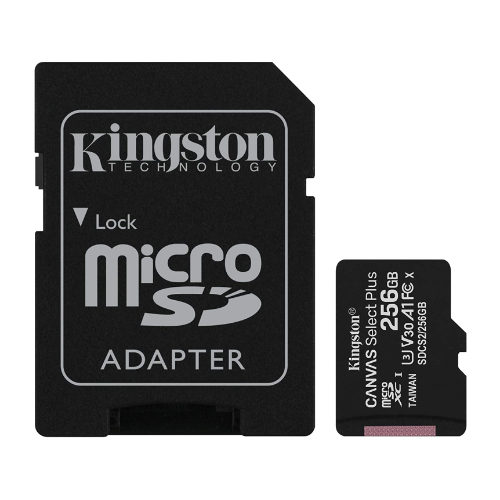
Kingston Canvas Select Plus 256GB
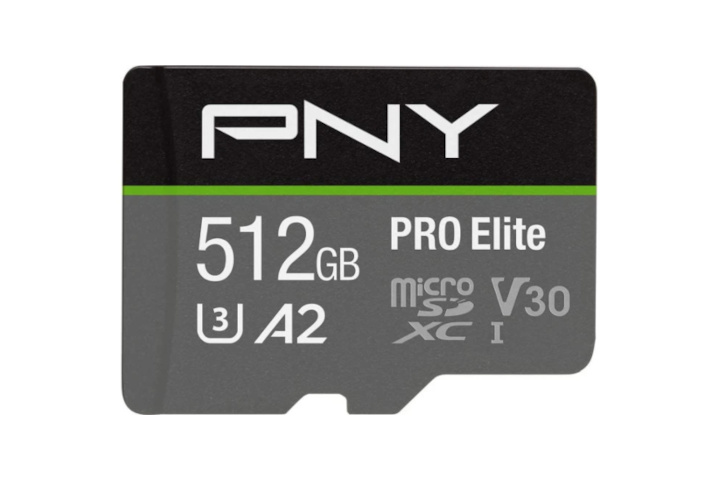
PNY Pro Elite 512GB
Pros
- Run apps directly from the card
- Waterproof, shock-proof, and magnet-proof
- Fast read and write speeds
- U3 and V30 ratings
Cons
- Can handle 4K video, but there are better options available
If you’re not sure you need 1TB of storage — but 256GB seems like too little — this 512GB microSD card from PNY is the perfect middle ground. True, it’s not the fastest, with read speeds of up to 100MBps and write speeds of up to 90MBps, but it’s a great option for your phone, as it runs apps directly from the microSD card. Its U3 and V30 ratings mean it can handle 4K video, though if this is your main reason for buying the card, we recommend upgrading to the SanDisk Extreme 1TB instead. It’s also waterproof, shockproof, and magnet-proof, so it’s a great choice if you frequently switch your card between devices.

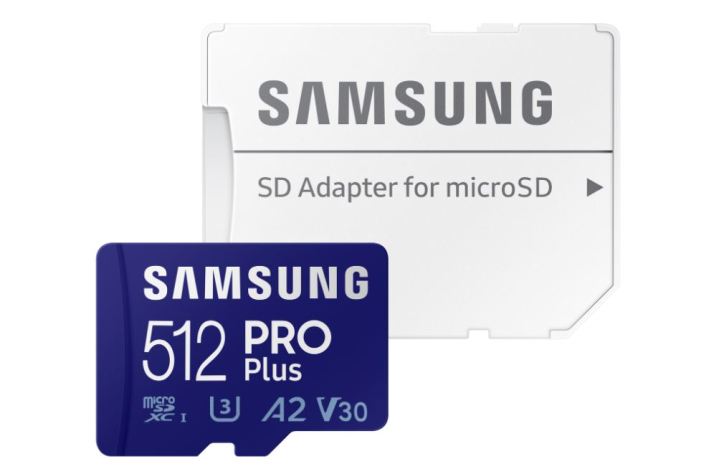
Samsung Pro Plus 512GB
Pros
- Read speeds up to 160MBps
- Write speeds up to 120MBps
- U3 and V30 ratings
- Support for 4K video recording
The Samsung Pro Plus embodies excellent speeds at a reasonable price when it comes to price and performance. It has read speeds of up to 160MBps and write speeds of up to 120MBps, with various storage capacities that fit your needs. Additionally, with its U3 and V30 ratings, this card can even handle 4K video with ease, making it perfect for use with the latest DSLR cameras. Therefore, we recommend this card as it is optimized to take advantage of your Samsung mobile devices — even if the latest Samsung flagships don’t include space for microSD cards these days.

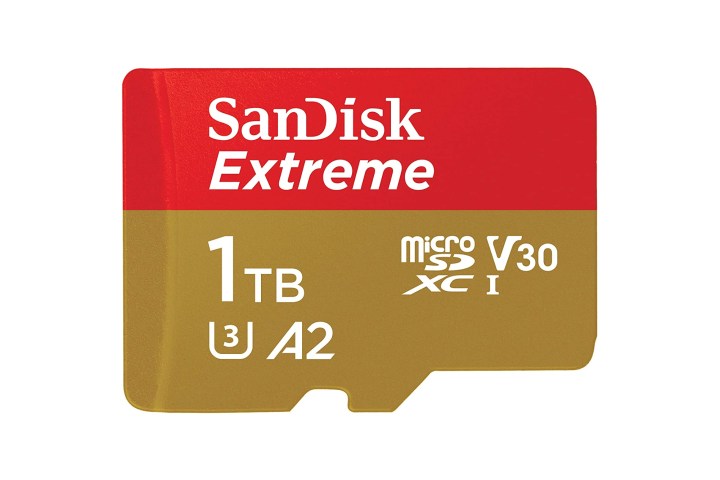
SanDisk
SanDisk Extreme 1TB
Pros
- Plenty of storage space
- UHS Speed Class 3 and V30 ratings
- 160MBps read speeds
- 90MBps write speeds
- Supports 4K video recording
Cons
- Some reviews mention defective cards
If your main priority is storage, then look no further than the 1TB option from the Sandisk Extreme line. This product comes with expanded storage options, and its UHS 3 and V30 Speed Class ratings both mean it’s capable of handling 4K video recording with ease. The card’s read speeds measure at about 160MBps, and its write speeds reach up to 90MBps. You’ll want to ensure your device is fully compatible with maximizing that potential performance. On top of all of these excellent performance features, the card also received one of the highest possible A2 ratings for its storage capabilities on Android devices.
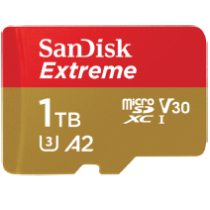
Frequently Asked Questions
What should you consider when buying a microSD card?
There are a handful of things to consider when you’re choosing a new microSD card for your phone. Obviously, the price and capacity are going to be factors, but you also need to make sure that the type of card you buy is supported by your device and that it’s suitable for your needs. This includes thinking about things like SDHC and SDXC, Speed Class ratings, Application Performance Class, and more.
SDHC or SDXC?
SDHC stands for Secure Digital High Capacity, and SDXC stands for Secure Digital Extended Capacity. The only real difference is the range of data they can store. You’ll find that SDHC microSD cards range from 2GB to 32GB in size, while SDXC microSD cards can range from 32GB up to 2TB in size, though the biggest microSD card we’ve seen so far is 1TB.
What are Speed Class ratings?
You’ll probably come across a slew of number-symbol combinations printed on cards and their packaging. These are Speed Class indicators that refer to a microSD card’s minimum sustained write speed. Write speed tells you how quickly data can be saved to the card and is expressed in megabytes per second (MBps). It’s useful to keep in mind when shopping for certain use cases like video recording. There are currently three classes: Speed Class, Ultra High Speed (UHS) Speed Class, and Video Speed Class. The original Speed Class is denoted by the write speed enclosed in a large “C,” while UHS Speed Class is shown with a Class number inside a large “U.” The mark for Video Speed Class is a stylized “V” followed by the write speed. Here’s how the minimum speeds for the different classes break down.
| Class | Minimum write speed |
|---|---|
| 2 | 2MBps |
| 4 | 4MBps |
| 6 | 6MBps |
| 8 | 8MBps |
| 10 | 10MBps |
| UHS 1 | 10MBps |
| UHS 3 | 30MBps |
| V6 | 6MBps |
| V10 | 10MBps |
| V30 | 30MBps |
| V60 | 60MBps |
| V90 | 90MBps |
Most reputable microSD cards these days will have at least a Class 10 write speed rating. These are just minimum requirements, and many cards are capable of faster speeds than their rating. A Class 10 card may offer 95MBps, for example. Read or transfer speeds are likely to be respectable — around 100MBps — across many options as well.
What is Application Performance Class?
The SD Association also has a standard called Application Performance Class, which is designed to highlight microSD cards that are suitable for use in smartphones and tablets. The A1 rating means that the card can manage random read input-output access per second (IOPS) of 1,500 and write IOPS of 500. The A2 rating indicates random read input-output access per second of 4,000 and write IOPS of 2,000. This is ideal for quickly opening apps and processing tasks. These A1 and A2 cards are worth looking out for if you intend to format your card as internal storage in an Android device, something Google calls Adoptable Storage.
How do you choose a microSD card for your needs?
If you are simply focused on adding storage capacity for downloaded files and casual pictures and videos, the lower Speed Class ratings will do just fine for your phone or tablet. Content creators shooting a lot of video will want to look for higher-end Class 10 and UHS microSD cards, at the very least. These will be better equipped to handle 4K resolutions and high frame rates of 60 frames per second or 120 fps. Android power users may want to consider cards with the App Performance Class designation.
In any case, you’re obviously going to want the highest speed, highest capacity microSD card you can get for the lowest price. We would advise you to factor in the brand reputation and the reported performance and reliability. Check out the warranty terms, just in case something should go wrong. You also need to be careful where you buy. If you’re going to use Amazon or eBay, then read some customer reviews and watch out for fake microSD cards, because they’re disappointingly common.
Editors’ Recommendations



